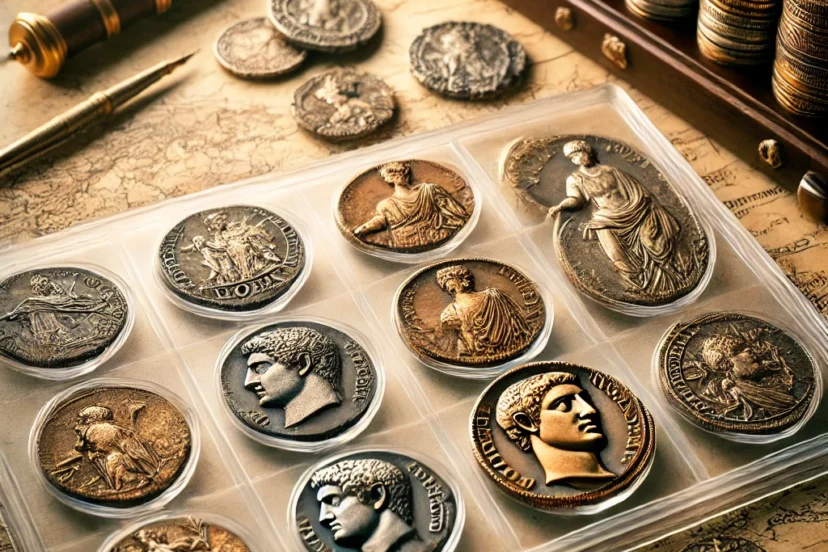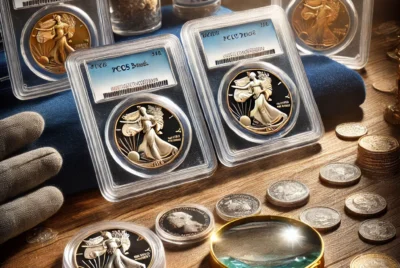Roman Coins for Sale: A Collector’s Guide to Ancient Currency
Introduction
The world of numismatics is vast and fascinating, with Roman coins holding a particularly special place in the hearts of collectors and historians. These ancient artifacts not only serve as valuable collector’s items but also provide deep insights into the history, economy, politics, and art of the Roman Empire. Whether you’re a seasoned collector or a beginner looking to purchase your first piece of ancient currency, this guide will walk you through everything you need to know about Roman coins for sale.
The Historical Significance of Roman Coins
Roman coins were more than just a means of trade; they were tools of propaganda, status symbols, and representations of the economic and political state of the empire. The imagery and inscriptions on Roman coins reveal much about the rulers of the time, significant events, and even aspects of daily life.
Major Periods of Roman Coinage
- Republican Coinage (509 BC – 27 BC)
- Predominantly silver and bronze coins
- Featured mythological symbols and portraits of famous Romans
- Denarius became the standard silver coin
- Imperial Coinage (27 BC – 476 AD)
- Featured the emperor’s portrait on one side (obverse)
- Depictions of gods, military victories, and monuments on the reverse
- Gold Aureus, Silver Denarius, and Bronze Sestertius were common
- Byzantine Coinage (476 AD – 1453 AD)
- Transition from classical Roman imagery to Christian symbolism
- Introduction of new coin denominations like the Solidus and Follis
Why Buy Roman Coins?
Roman coins are more than just collectibles; they offer historical and financial value. Here are some reasons why collectors seek Roman coins for sale:
- Historical Connection – Owning a Roman coin is like holding a piece of history.
- Investment Potential – The value of rare Roman coins has steadily increased over time.
- Aesthetic Appeal – Ancient coins feature intricate designs and craftsmanship.
- Educational Significance – Studying coins provides insights into Roman culture, economy, and politics.
- Personal Enjoyment – The thrill of discovering and acquiring ancient artifacts.
Understanding Roman Coin Types
When looking at Roman coins for sale, understanding the various types helps you make informed decisions.
Denarius (Silver Coin)
- One of the most common and widely used coins of the Roman Republic and Empire
- Often featured emperors and important historical figures
Aureus (Gold Coin)
- High-value coin used for large transactions and rewards
- Typically bore the portrait of the ruling emperor
Sestertius (Bronze Coin)
- Large, durable coin used in everyday transactions
- Showcased detailed engravings and was commonly used in propaganda
Follis (Copper Coin)
- Introduced in the later Roman Empire and Byzantine era
- Featured Christian symbols as the empire transitioned to Christianity
Where to Find Roman Coins for Sale
If you’re looking to purchase authentic Roman coins, there are several avenues to explore:
Online Marketplaces
- eBay – A popular platform where many Roman coins are available, but requires caution to avoid fakes.
- Heritage Auctions – Specializes in high-quality and authenticated ancient coins.
- VCoins – A trusted marketplace with reputable dealers adhering to ethical selling standards.
- MA-Shops – A European-based online coin shop offering a wide range of Roman coins.
Coin Dealers & Shops
- Visiting local or specialized numismatic dealers provides an opportunity to examine coins before purchase.
- Check for professional accreditation, such as membership in the American Numismatic Association (ANA) or Professional Numismatists Guild (PNG).
Coin Shows & Auctions
- Attending numismatic events and auctions, such as Baldwin’s Auctions or Stack’s Bowers, offers access to rare and graded Roman coins.
Museums & Exhibitions
- Some museums and exhibitions sell authentic Roman coins in their gift shops.
Factors to Consider When Buying Roman Coins
To make a smart purchase, consider these factors:
1. Authenticity
- Ensure the coin is certified by professional grading services like NGC Ancients or PCGS.
- Buy from reputable dealers to avoid counterfeit coins.
2. Condition & Grade
- Roman coins range from Poor (P-1) to Mint State (MS-70).
- Higher grades fetch higher prices but even well-worn coins can be valuable.
3. Rarity & Demand
- Coins from rare emperors, special historical events, or low mintage periods tend to be more expensive.
4. Price & Budget
- Prices for Roman coins can range from $20 for common bronzes to thousands of dollars for gold Aureus coins.
- Compare prices across different sellers to ensure fair value.
How to Preserve and Store Roman Coins
Proper storage and care are essential to maintain the condition and value of ancient coins:
- Use Coin Holders – Store coins in air-tight holders or acid-free flips.
- Avoid Cleaning Coins – Cleaning can damage the coin’s patina and reduce its value.
- Maintain Stable Temperature & Humidity – Store coins in a cool, dry place.
- Label & Catalog – Keep detailed records of each coin’s history and purchase details.
Selling Roman Coins
If you decide to sell your Roman coins, consider these options:
- Online Marketplaces – Selling on eBay, Heritage Auctions, or VCoins can reach a broad audience.
- Coin Dealers – Reputable dealers may offer immediate cash offers.
- Auctions – High-end rare coins may fetch better prices through auctions.
- Private Sales – Selling directly to collectors may yield better returns.
Investment Potential of Roman Coins
Roman coins have proven to be a stable long-term investment. The market for high-quality ancient coins continues to grow, driven by:
- Increasing Demand – More collectors and investors are entering the market.
- Historical Scarcity – Unlike modern coins, Roman coins are finite in supply.
- Global Interest – Roman history is studied worldwide, increasing demand for authentic artifacts.
Conclusion
Roman coins are fascinating relics that connect collectors to the grandeur of the ancient world. Whether you’re purchasing a coin for its historical significance, aesthetic beauty, or investment potential, understanding the intricacies of Roman coins for sale is crucial. By buying from reputable sources, verifying authenticity, and properly storing your coins, you can build a remarkable collection that stands the test of time.
Whether you’re a beginner or an experienced numismatist, the allure of Roman coins offers an exciting and rewarding journey into the past. Happy collecting!


CreatBot D600 Pro 2 is a state-of-the-art industrial 3D printer designed for engineers demanding accuracy, reliability, and flexibility in 3D printing. As part of the D600 series, it incorporates a large build volume, advanced dual extrusion technology, and high-performance features suitable for industrial-scale applications and varied materials.
Overview of the CreatBot D600 Series
The CreatBot D600 and D600 Pro establish new standards for large-scale 3D printers solutions. With a build volume of 600 ? 600 ? 600 mm, these professional large format 3D printers cater to a wide range of industrial 3D printing demands, from large model prototyping to end-use production. The D600 Pro lineup and the latest D600 Pro 2 introduce further enhancements in performance and material compatibility.
Main Features and Benefits
Large Industrial Build Volume
Build size: 600 ? 600 ? 600 mm
Ideal for large-scale 3D printer projects and industrial 3D printing
Supports technical materials and complex prototypes
Dual Extrusion and High-Heat Printing
4th generation dual 1.75mm extruders for multi-material printing
Right and left extruder design for flexible printing
Supports high performance 3D materials, including PLA filament, nylon, carbon fiber, and more
Maximum nozzle temperature: up to 420°C (high-heat)
Heated build chamber for premium applications
Precision, Speed and Reliability
Professional 3D print quality with accurate layer resolution
Advanced motion system for fast printing and robust performance
Consistent printing speed up to 120 mm/s
Reliable operation for continuous industrial use
Supported Materials and Filaments
Wide Filament Compatibility
Works with a broad spectrum of filament types: PLA, ABS, PC, PETG, PVA, nylon filament, carbon fiber, and more
Designed for technical materials and functional prototyping
Advanced dual extruder 3d printer enables multi-material and soluble support printing
Uses: Prototyping & Manufacturing
The CreatBot D600 Pro 2 and D600 Pro 3D printer serve a diverse set of applications:
Rapid prototyping and large scale 3D printing models
Functional parts for automotive, aerospace, and engineering
Tooling, jigs, and fixtures for industrial production
Art, architecture, and creative projects requiring large-scale industrial 3d printing
Technical Specifications
Model: CreatBot D600 Pro 2, D600 Pro, D600
Build volume: 600 ? 600 ? 600 mm
Extruders: Dual extruder, 4th generation 1.75mm dual extruders and hotends
Max nozzle temperature: 420°C
Bed temperature: up to 100°C
Filament diameter: 1.75 mm
Layer resolution: 0.05 – 0.3 mm
Supported materials: PLA, ABS, PC, PETG, PVA, nylon, carbon fiber, engineering-grade materials
Printing speed: up to 120 mm/s
Chamber: Heated, for improved material properties
Interface: Touchscreen interface
File formats: STL, OBJ, AMF
Comparing D600 Models
Feature Differences
D600 model: Entry-level industrial large scale 3d printer for basic applications
D600 Pro: Enhanced with heated chamber, auto bed leveling, and wider material support
D600 Pro 2 model (professional version): Adds higher print speed, improved reliability, and HS (high speed) configuration
Other CreatBot Models
CreatBot D1000 for even larger build volumes
CreatBot lineup includes industrial and professional 3d printer solutions
Frequently Asked Questions (FAQ)
Compatible Materials for CreatBot D600 Pro 2
The D600 Pro 2 is compatible with a wide range of filament including PLA, ABS, PETG, PC, nylon filament, carbon-fiber, and other engineering-grade materials.
Maximum Build Volume of D600 Pro 2
The printing volume is 600 ? 600 ? 600 mm, supporting large-scale and industrial 3d printing needs.
Does the D600 Pro 2 support dual extruder and high-temperature printing?
Yes, it is equipped with dual extruder technology and reaches up to 420°C for high-temperature printing process.
What differentiates the D600 Pro 2 from the D600 Pro?
The Pro Version offers higher printing speed, improved reliability, and the new HS (high speed) option.
Conclusion
The CreatBot D600 Pro 2 and the CreatBot D600 Pro industrial professional set the benchmark in the industrial 3D printer category. With exceptional build volume, robust dual extrusion system, compatibility with engineering-grade materials, and high performance across applications, they empower businesses and engineers to achieve new heights in industrial 3D print.
d600 series
3d print
dual extruder
d600 and d600 pro